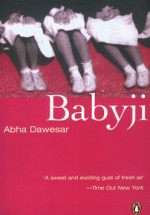Book Review
A Lesbian Lolita
Farah Ameen
From the land of the Kamasutra, we have a bold book that explores same-sex love. Babyji, Abha Dawesar's second novel, is a lesbian Lolita set in Delhi. Its heroine, Anamika Sharma, is the Head Prefect of her school, an ace at quantum physics and a brilliant student who secretly reads the Kamasutra in her family's scooter garage. When her parents drag their teenager to parties, she passes time imagining the women "minus their small, tight blouses." As Anamika explores her sexuality, she faces moral and emotional dilemmas that are heightened by her attraction to women in a conservativesociety.The book begins by setting the scene: "Delhi is a city where things happen undercover . . . In the Delhi I grew up in . . . Married women fell in love with pubescent girls, boys climbed up sewage pipes to consort with their neighbor's wives, and students went down on their science teachers in the lab. But no one talked about it." The reader then follows the short-haired, pants-and-shirt-wearing Anamika through some far-fetched events, starting with her meeting an older, elegant divorcee (whom she nicknames "India") who's instantly enthralled by the high-schooler. What ensue are passionate daytime and late-night trysts. After her first sexually-charged rendezvous with India, Anamika sees a beautiful young woman at a construction site who moons her. This fascinates the girl, as she'd always thought that lower-caste women were more conservative than their educated middle-class counterparts. In an unbelievable coincidence, the same person, Rani (real name: Basanti; here, she's Anamika's "queen"), shows up seeking work at the Sharma house, and begins calling Anamika "Babyji." Once she's hired, Rani does the dishes and then massages Anamika's legs. While this is common in South Asia, here it's foreplay. It seems that whomever this Indian Lolita covets reciprocates her affections. Anamika persuades her parents to let Rani live there (so her husband can't beat her to death) and sleep in her room, supposedly on the floor. They embark on a torrid affair, with the maid sneaking onto her little mistress's bed every night and the parents (mind-numbingly blind at this point) not a bit "suspicious"even when Anamika starts locking her door. Not content with juggling two older lovers, Anamika seduces her classmate Sheela, who can't understand how girls can love each other in a sexual way but is curious enough to eventually permit the intimacy. To make sense of these life-changing events, Anamika asks her best friend Vidura's father, Adit, questions about life and sexuality. Attracted to the tomboy vixen young enough to be his daughter, Adit responds but makes inappropriate advances toward her; Anamika is strangely drawn to this sophisticated man and he becomes her confidante. Dawesar depicts teen angst and the taboo surrounding lesbian interludes in a society where homosexuality is not widely accepted. Meanwhile, in this coming-of-age book, which at times devolves into a series of sexual escapades, none of the adults appear overly concerned about sexually manipulating the adolescent Babyji--a lively, likable character to whom everything seems to come a little too easily. For someone raised in a Brahmin household, Anamika pursues her love interests without much of the soul-searching common among many teen lesbians. And though she ponders the inequalities between the middle class and their servants" bridging the gap by encouraging others to treat her "lower-caste lover like a family member" her relationship with Rani seems too pat to be credible. Her budding affair with Sheela is the only plausible thread in the story. Babyji deals with important social and sexual topics, but left me wanting more introspection. Farah Ameen works as an editor in New York City.
|

Babyji, by Abha Dawesar; New Delhi: Penguin India; 2005; Rs. 295; pp. 399. |